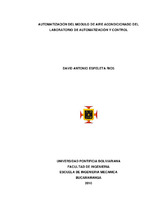| dc.contributor.advisor | Córdoba Tuta, Edwin Jesús | |
| dc.contributor.author | Espeleta Rios, David Antonio | |
| dc.coverage.spatial | Seccional Bucaramanga. Universidad Pontificia Bolivariana. Escuela de Ingeniería. Facultad de Ingeniería Mecánica | spa |
| dc.coverage.temporal | 2010 | |
| dc.date.accessioned | 2013-08-28T16:59:32Z | |
| dc.date.available | 2013-08-28T16:59:32Z | |
| dc.date.created | 2010-07-30 | |
| dc.date.issued | 2013-08-28 | |
| dc.identifier.uri | http://hdl.handle.net/20.500.11912/815 | |
| dc.description | 193p.: (pdf); il; gráficas; tablas; anexos | spa |
| dc.description.abstract | El objetivo principal de este proyecto es la habilitación del funcionamiento del modulo de aire acondicionado del laboratorio de automatización y control que se encuentra en el edificio I de la Universidad Pontificia Bolivariana seccional Bucaramanga. Equipo que se hallaba en buenas condiciones físicas, pero carente de un sistema de control automatizado. Dicho sistema de gobernación y manipulación será concebido por medio de la programación de estrategias de control, haciendo uso del software “STEP 7” de “Siemens”, fabricante del PLC que rige las funciones del modulo de aire acondicionado. Además para facilitar la utilización e interacción con el sistema, fue posible activar el uso de la red Ethernet interna de la Universidad Pontificia Bolivariana seccional Bucaramanga para establecer un vínculo entre el PLC y cualquier computador con acceso a esta red. Este enlace se lleva a cabo gracias a la Interfaz Hombre-Máquina, con sus siglas en ingles HMI (Human Machine Interface), desarrollada en Microsoft Office Excel 2007, que permite el acceso, monitoreo y manipulación de las múltiples variables presentes en el sistema. | spa |
| dc.description.abstract | The main objective of this project is to enable the function of the air conditioner module of the Automatization and control laboratory located in the “I” building of the “Universidad Pontificia Bolivarian” Bucaramanga’s campus. Equipment which is found in good physical conditions, but with lack of an automatizated control system. The above-mentioned governor and manipulator system will be conceive through the programming of control strategies, using the software “STEP 7” from “Siemens”, PLC’s manufacturer who manage the air conditioner module functions. As well to facilitate the utilization and interaction with the system, it was possible to permit the use of the internal Universidad Pontificia Bolivariana’s Ethernet network at Bucaramanga’s campus to establish a link between the PLC and any computer with access to this network. This link it’s made by a HMI (Human Machine Interface), developed in Microsoft Office Excel 2007, allowing the access, monitoring and manipulation the multiple variables in the system. | |
| dc.language.iso | es | |
| dc.publisher | Universidad Pontificia Bolivariana | spa |
| dc.rights | Attribution-NonCommercial-NoDerivatives 4.0 International | * |
| dc.rights.uri | http://creativecommons.org/licenses/by-nc-nd/4.0/ | * |
| dc.subject | Tesis y disertaciones académicas | spa |
| dc.subject | Ingeniería mecánica | spa |
| dc.subject | Aire acondicionado | spa |
| dc.subject | Aire acondicionado - automatización | spa |
| dc.subject | Aire acondicionado - control | spa |
| dc.title | Automatización del módulo de aire acondicionado del laboratorio de automatización y control | spa |
| dc.type | bacherlorThesis | spa |
| dc.rights.accessRights | openAccess | spa |
| dc.type.hasVersion | publishedVersion | spa |
| dc.identifier.instname | instname:Universidad Pontificia Bolivariana | spa |
| dc.identifier.reponame | reponame:Repositorio Institucional de la Universidad Pontificia Bolivariana | spa |
| dc.identifier.repourl | repourl:https://repository.unab.edu.co/ | |


